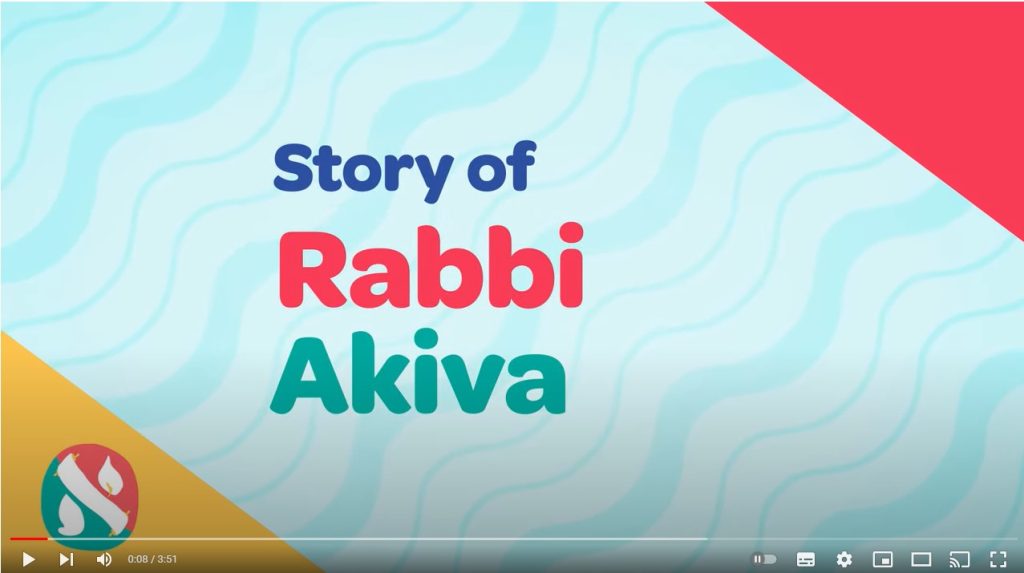Lag BaOmer 5784 – May 26 in 2024
Lag BaOmer – the 18the of Iyar – is the day commemorating, among other things, the end of a plague that prevailed among Rabbi Akiva’s students.
Originally, Rabbi Akiva was a shepherd. One day he saw how water was able to break stones. As he was reflecting on this, he thought that – even now in later life – he would be able to study Torah. Drop by drop, Torah would influence his heart and mind. And it did. He became such a great scholar and mystic that he is also called Rosh la-Chachamiem (Head of all scholars). He made important contributions to the Mishnah and to the Midrash Halacha. His teachings highlighted the concept of unity by drawing attention to Psalm 133:1
| A song of ascents. Of David. How good and how pleasant it is that brothers dwell together. | שִׁ֥יר הַֽמַּעֲל֗וֹת לְדָ֫וִ֥ד הִנֵּ֣ה מַה־טּ֭וֹב וּמַה־נָּעִ֑ים שֶׁ֖בֶת אַחִ֣ים גַּם־יָֽחַד׃ |
This unity encompasses all of humanity, both Jews and non-Jews, and extends to all existence, as we are all creations of G-d.[1]
Some famous sayings of Rabbi Akiva were:
- Everything is foreseen (by G‑d), yet freedom of choice is given, and the world is judged with grace, yet all is according to the amount of work accomplished
- Whatever G‑d does is for the best
- “Love your fellow as yourself’ is a cardinal principle in the Torah
How is it that under the leadership of such a great rabbi, there was a plague among his students that led to the deaths of 24,000 students (more correctly 12,000 pairs of students). The death penalty – by the hand of Heaven – is a punishment that is not given lightly. Chazal taught that they did not have enough respect for each other. Why did they deserve the death penalty? That those not sound as a capital sin.
How come that the students didn’t have enough respect for each other?
Rabbi Akiva’s students had certainly learned to love their neighbor. Indeed, they had loved their neighbor as much as themselves, to the point where they could not relate to their situation. That they could no longer understand that their neighbor had developed a different view in response to Rabbi Akiva’s words and teachings, and that that view was also good. More than that, every person has his own unique way to go and way he learns and way he serves Hashem. An important lesson we can learn from this is that we should always respect another person’s Torah view, we should be able to accept that others may have a different view in, for example, how best to serve Hashem.
Why such a harsh punishment
Why did they deserve death? Was it just because they did not treat each other with respect? Was it because they shouted at each other? Was it because they insulted each other? These would all be terrible, but they are not capital crimes. All these acts involve only a prohibition of Ona’as (hurtful words) [Vaykira 25:17]. It is a negative prohibition, but not one that deserves the death penalty in the Hand of Heaven.
Rabbi Akiva’s students were great Torah scholars. They would have become great leaders in the world. If such great scholars do not treat each other with respect, they profane the name of G-d in the world, it is a disgrace to the reputation of the Torah. Chilul Hashem, is a sin punishable by the death penalty by the Hand of Heaven, especially for students at such a high level.
Why 24.000 Students, and why in the Time of the Omer
In the time of Balak, there was a punishment among the people for having intercourse with the women of Midian, which also led them to idolatry. They receive the death penalty. These 24000 souls, in their reincarnation, became the students of Akiva – who was a reincarnation of Zimri, a prince of the tribe of Shimon, who committed the offense as an act of public rebellion against Moses, and he (Zimri) was executed for it by Pinchas. See Numbers 25:1-9.
The whole learning process was a tikun for the past. Because of their education from Akiva, they had reached a tremendously high level.
But why exactly 24000? The Hebrew word for jar is כד which has the numerical value of 24. The time of the Omer count is used to improve man’s emotional attributes. This is associated with the 10 seferit. The number 1000 indicates the great importance of this improvement of emotional traits.
These souls die for the first time because of idolatry, and for the second time because of Chilul Hashem, because they did not having enough respect for each other. This is one of the emotional learning points precisely in the time of the Omer.
What can Noahides learn from Lag Ba’omer
Differences need not cause division. On the contrary, true unity arises from the coming together of diverse – and even opposing – perspectives. The various differences between people are thus overshadowed by what we all share. It’s like a diamond: different insights are like the various facets, each offering a unique brilliance. Therefore, a person should not feel threatened by the differences between themselves and others. Instead, they should reach out to others with love and seek to help them, so that together we can see the full spectrum of the diamond.
Let us all use Lag Ba’omer to improve our emotional qualities so that we learn to treat Hashem and our neighbor with respect and love.

By Angelique Sijbolts
Sources: 24,000 Plus One, Rabbi Akiva: His Life and Teachings, Gemora tractate of Yevamos (62b), Growing Together On Lag Baomer: The Legacy of Rabbi Akiva, Rabbi Akiva’s Students Did Not Die for the Crime of Disrespectful Behavior, Sefer Gilgulei Neshamot (20:2) Pinchas and Zimri: The Anatomy of an Argument
[1] Article AskNoah 33rd Day of the Omer, Lag B’Omer: Universal Message
Texts: Sefaria.org
Thanks to Rabbi W. van Dijk for the inspiring question, to Rabbi B. Simcha who answerd for me the question: Why the amount was specifically 24,000 students who died.
Thanks to Rabbi Tani Burton for the feedback
Original Published in 2023
© Copyright, all rights reserved. If you enjoyed this article, we encourage you to distribute it further.
